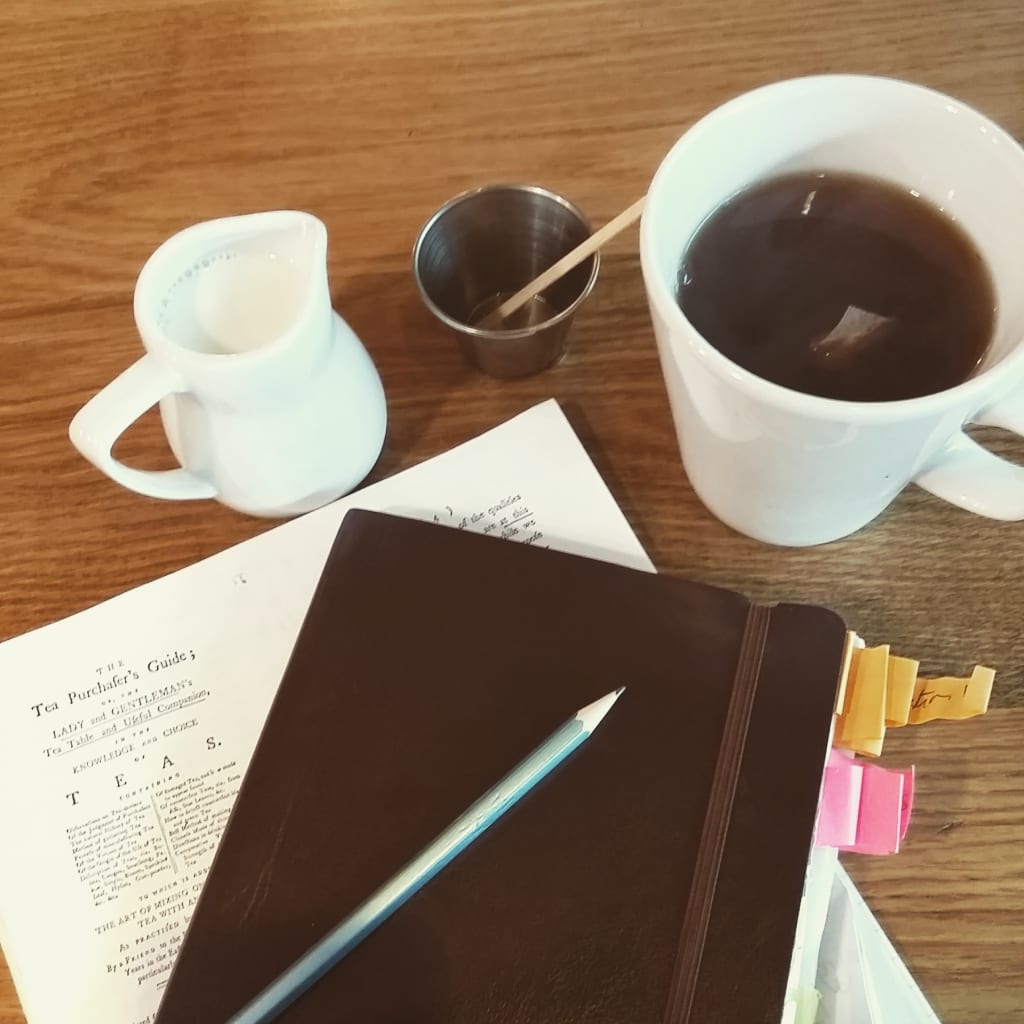Plen-tea to Talk About...
Tea puns are the least of your worries when the history of tea itself is obscured by national fervour.

Tea. The national drink of Britain. We cannot get enough of the stuff. Whether it’s a warm or cold day, we will still faithfully put the kettle on like the automatons that we are. Forget the pop culture of today surrounding tea, let’s explore the deeper, and arguably murkier, depths that revolve the academic study of it.
It’s barely there! Like the milkiest brew where the teabag is brutally snatched from the cup within two seconds of it passing over it—just a mere shadow of the savoury strong stuff—the academic history surrounding tea is not exactly endless. Despite the ongoing raging debates over the internet, tea has barely surfaced in the academic world beyond a few authors. Notably Markman Ellis, who also specialises in eighteenth-century coffee shops. Despite this, tea has been an important part of British history, and not only because of the empire (again) and the income it derived from it, but because of its influence as a national drink. Friendships are gained and lost based on one’s brew. Tea has entered the national psyche and this nationalistic fervour has transmuted into the work of historians.
When researching tea, one of my favourite historians to have written on the subject must be Denys Forrest. Of which, just a few mere snippets convey the emotions that tea stirs in even the most fact driven of workplaces: academia.
“tea… fill[ed] the gap of which we are all so conscious as the hands of the clock approach 4.30” - (Denys Forrest, Tea for the British, 1973, p.60/1
“a warm resistless tide of tea, then, flooding into the second half of the 18th century, acclaimed by some, deplored by others, accepted gratefully by most” - (p.62)
“tea… throws down the conventional barriers between the sexes, taming the rude strength of one and enabling the graceful weakness of the other” - (p.87)
“a well-made pot of tea – freshly boiling water, good leaf and plenty of it – still provides the mild stimulus, the sense of well-being, that was the secret of its original magic for the British people” - (p.280)
Written in 1973, the last quote, especially, still rings true today. These are just some of my favourite snippets. On page 250, it includes an interesting fact about the British people and teabags. When first introduced to them, we opened them up and put them into our pots and strainers by emptying them; quite missing the point of "pre-packaged product." I’ve highlighted my favourite parts and, as you can see, it appears also to entertain. The title is, after all, Tea for the British, one that will appeal to the British sensibility of appearing a little uppity as tea establishes its place as our national drink.
Historians cannot escape the impetus of pop culture, it seeps into their work from many angles, and writing like this displays this emotive way of writing history. “Warm resistless tide” and “magic” evoke a sense of wonder at this product and it’s a rather impressive claim that it can “tam[e] the rude strength of one [sex] and enabl[e] the graceful weakness of the other.” Anyone who knows me will know this is codswallop unless it’s my first cup of the day. For a piece of historical writing, it does include facts and figures but it is these moments of emotion and true feeling that express and display the problematic representation of tea within history. Historians studying tea in Britain get caught up in this national fervour of tea puns and teatime paraphernalia that it is impossible not to join in.
And—controversial statement coming up—why not?
If it is a history such enjoyed by the public in such a way whether they like tea or not, then surely it is a truer expression and depiction of tea’s history in Britain than lists and charts of tea rations of the twentieth-century or the types of tea available at various points in Britain’s history. History is always a celebration of some kind of history whether it is whiggish or not, so a celebration would surely evoke the national feeling in its depiction. Historians are directed by public attitude anyway, due to the demands of publishers who want a particular book written by a particular time for a particular audience that portrays the kind of history that they want so that it sells. Therefore the public is integral to the history that is written and explored and therefore the national feeling is transmuted and translated into a historian’s work.
Tea’s history is important to study, however, because of its obvious links to the British empire and nineteenth-century philanthropy. If you ever want to study how the British manipulated the public through tea, just look at how in the Victorian age Chinese tea began to be seen as dirty and of a lower standard as compared to the tea leaves coming from India, although a century previous, Chinese tea leaves were the norm. This is because the tea coming from India was coming from parts of the British empire: it was portrayed as clean and unadulterated to encourage importing from India rather than China. The British created and used stereotypes to make India preferable and therefore also the empire.
Not all of tea’s history is this ugly though. Tea has long had a history with Quakers, such as the Tuke family in York. Of which there are numerous links to philanthropy such as Joseph Rowntree who improved working conditions for the workers in his chocolate factories in York during the great Victorian philanthropy age. Tea was also seen as the weapon of choice during the temperance movement. Frank Trentmann on the merits of tea argues that “neither coffee nor tea had to overcome a… taint of colonial impurity… the exotic was an asset for them” (Empire of Things: How we became a world of consumers, from the Fifteenth Century to the Twenty-First, 2016, p. 84). This quote is drier than the ones from Forrest but one small quip from Trentmann always tickles my fancy:
“Americans switched to coffee after independence” – (92)
Tea can leave an ugly brown stain on the table, yet it can also flow into something a little sweeter.
As you can see throughout this article, I have teased and prodded playfully at the current hot topic, raging tea debates that occur on many different social media platforms. From outrages over the colour charts of tea and the snobbery that entails, to the ongoing feud between coffee and tea, and the outrage expressed by British people at the lack of kettle in the American procedure for making tea. I, too, have embraced the public fervour around tea to create an argument and debate around it. I’ve explored the problems of letting public attitudes guide your representation of history and the traps historians can fall into. And one could say that, as an avid tea drinker myself, I have fallen into this trap. Willingly though and in full awareness of it and the nuances you can use to play around it. As I am sure all historians do to some extent to inject a little fun into their writing. However, if we do not make the public aware that this is what we are attempting, and achieving, we risk altering history simply through a lack of differing perspectives on a subject. This is why we need more research done on tea and its effects on our society as to establish why we have such a national penchant for it because, as Trentmann puts it, “Britons were a nation of tea-drinkers, but never exclusively so,” (p. 165) so it is evidently our portrayal of it that has caused it to increase to such a fever pitch.
This all comes down to the politics behind written and academic history. The public is their own worst enemy when it comes to the truth of our nation’s history and the academic history of tea does not do a lot to change this. Never would I have thought that tea would be too much of an emotive subject for it to be studied impartially. And on that note, it might be time to put the kettle on and rethink our strategy towards the history of tea.
About the Creator
Elisabeth Millard
Recent University of York graduate with a passion for history, literature, heritage and all things fantasy or sci-fi.






Comments
There are no comments for this story
Be the first to respond and start the conversation.